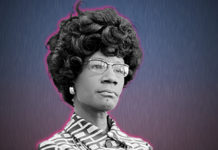Parents often know when their children have engaged in mischievous behavior. Sometimes, they become private investigators to get to the bottom of the mischief in question. Sometimes, once at the scene of the crime, the child may have told on themselves.
For example, a rule in my home is no ice cream after school. Fruit, crackers and cereal are the available snack options. One day, I came home to find a spoon with chocolate ice cream residue on the kitchen table, in the spot where my oldest daughter usually sits. But I knew she didn’t eat the ice cream. My son had the ice cream. I was assured of this when I saw the chocolate jimmies on the floor under the chair where he normally sits.
Also, he’s the only child who eats chocolate ice cream.
I couldn’t help but laugh when I called him out on it because he told on himself. I did the same thing when I read the tweet of a white Rhode Island legislature saying that critical race theory (CRT) is to blame for the breakup of her friendship with a Black person.
I laughed because she said, “I had a Black friend…” She immediately told on herself.
Don’ get me wrong … there are white people who are friends with Black people. But those white people don’t broadcast it for mainstream consumption, and they don’t have to…
When a white person says they have a Black friend, it’s a red flag. When a white person says this to relay their disagreement with CRT, they’ve given the game away. This “Black friend” wasn’t really a friend at all. Don’ get me wrong … there are white people who are friends with Black people. But those white people don’t broadcast it for mainstream consumption, and they don’t have to because Black people, specifically, can tell when white people interact with Black people to the extent that friendships with Black people are a possibility.
We can tell because those white folks, who actually have Black friends, are comfortable around Black people. Africanisms, Black culture and Black pop culture don’t have to be explained or taught to them because they are aware of it. There’s an ease about how they navigate Black spaces; they don’t center our spaces on themselves or on white people in general.
They don’t get mad, frustrated or dismissive when we speak about our experiences; they’re open to dialogue and can agree how dysfunctional the social structure of society is and that racism is at the root of it.
Na, this legislator is like many white people who define and use the terms “friend” and “colleague” interchangeably when convenient or for an agenda. Her “Black friend” was actually a colleague in the state legislature. Representative Tiara Mack, the “Black friend,” said that they weren’t friends, just colleagues.
Ms. Mack used the vernacular and said, “we ain’t friends.”
The truth is that there are white people who only interact with Black people out of necessity and not because they genuinely want to engage with us. They interact with the Black cashier at the supermarket or the Black barista at Starbucks or the Black waiter or waitress at the restaurant they choose to eat at not simply because there’s no longer de jure segregation throughout society, but because those interactions seem more comfortable.
If white people wish to work where Black people are few to none, they can do that because systemic racism prevents Black people from entering certain industries. But white people shouldn’t get credit for choosing to work where they must share office space with Black people. Nor should they get credit for living in a neighborhood where a few Black families live or working in schools where Black people make up a sizable population of the students.
You don’t get credit for transactional human interaction.
You cannot use Black people to push an agenda or a narrative that harms Black people.
You cannot use Black people to push an agenda or a narrative that harms Black people – like introducing and passing legislation to prevent teachers from teaching about race and white supremacy in schools.
Critical race theory is an academic concept whose core idea is that race is a social construct, and that racism is not merely the product of individual bias or prejudice, but also something embedded in legal systems and policies.
It’s not a concept that makes white people make feel bad about being white. American history is what ought to invite white people to examine the harms done in this country because of whiteness, as well as compel them to dismantle and eradicate systemic racism. Sadly, the Rhode Island legislator doesn’t see it that way. Nor do the many other conservative legislators.
But, my message to those legislators is to keep telling on yourselves.
Keep highlighting your lack of Black friends, your lack of everyday interactions with Black people, the laws you introduce and pass that exacerbate systemic racism, and the laws you prevent from being voted on to stop systemic racism.
Sun Tsu once said that if you know the enemy and you know yourself, you don’t need to fear the result of a hundred battles. You can’t hide in plain sight, you’re too messy.
We see you.










